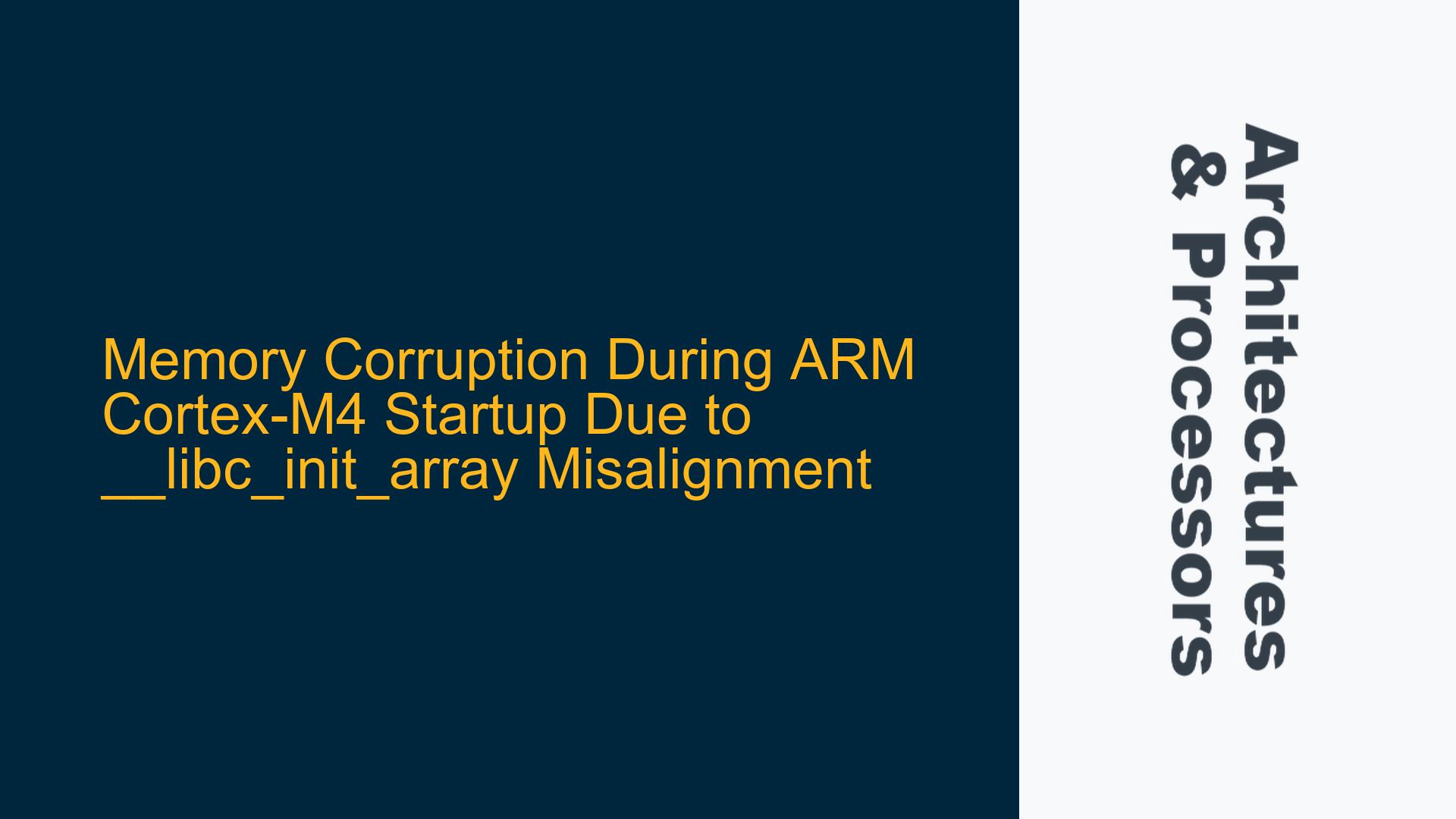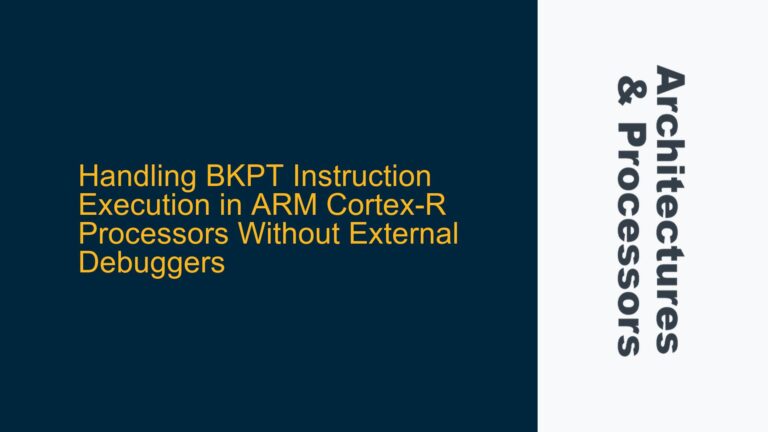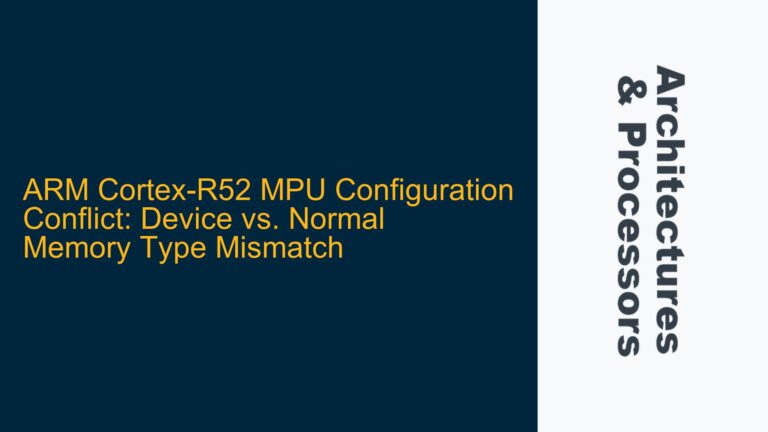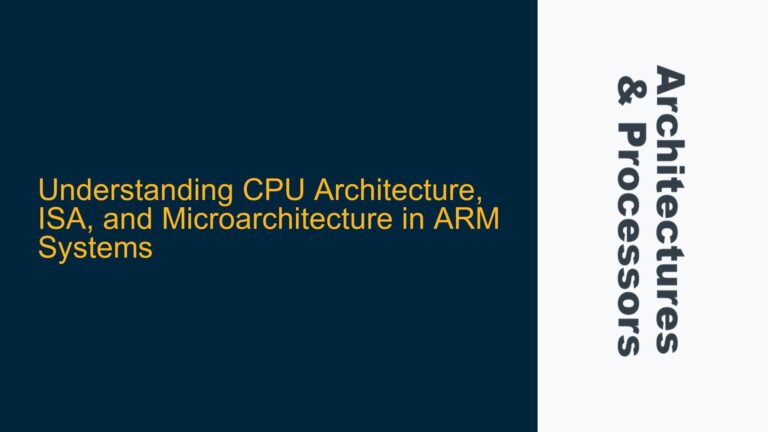ARM Cortex-M4 Startup Failure and Memory Corruption During __libc_init_array Execution
The issue described revolves around a memory-related runtime error occurring during the startup sequence of an STM32L476VGT microcontroller, specifically during the execution of the __libc_init_array function. This function is part of the C runtime initialization and is responsible for calling static constructors and initialization functions. The error manifests as an infinite loop in the Default_Handler, which is typically entered when an unexpected interrupt or fault occurs. The problem is influenced by the amount of statically allocated memory, with different behaviors observed based on the size of a statically allocated array. Specifically, when the array size exceeds a certain threshold, the system fails to execute __libc_init_array correctly, leading to a crash.
The root cause appears to be related to memory corruption or misalignment during the execution of __libc_init_array. This function iterates through the __init_array section, which contains function pointers to static constructors and initialization routines. If the __init_array section is corrupted or misaligned, the function pointers may be invalid, leading to a crash when attempting to call them. The issue is exacerbated by the size of statically allocated memory, suggesting that the memory layout or alignment is being affected by the amount of data being allocated.
Misaligned __init_array Section and Stack Overflow During Startup
The primary cause of the issue is likely a misalignment in the __init_array section, which contains function pointers that __libc_init_array iterates over. The __init_array section is typically placed in Flash memory, but if the linker script is not configured correctly, or if there is an alignment issue, the function pointers may be corrupted or misaligned. This misalignment can cause the function pointers to point to invalid memory addresses, leading to a crash when __libc_init_array attempts to call them.
Another possible cause is a stack overflow during the startup sequence. The stack is used during the execution of __libc_init_array to call the static constructors and initialization functions. If the stack size is insufficient, a stack overflow can occur, leading to memory corruption and a crash. This is particularly relevant in embedded systems where memory is limited, and the stack size must be carefully managed.
Additionally, the issue may be related to the compiler optimization level. The problem appears to be mitigated when the optimization level is reduced from -O3 to -O2, suggesting that certain optimizations may be introducing alignment issues or other subtle bugs. The alignment of functions and data sections can be affected by compiler optimizations, and if the alignment is not handled correctly, it can lead to memory corruption.
Debugging and Resolving __libc_init_array Misalignment and Stack Overflow Issues
To resolve the issue, several steps can be taken to debug and fix the misalignment and stack overflow problems:
-
Check and Adjust Linker Script Alignment: The first step is to review the linker script and ensure that the
__init_arraysection is correctly aligned. The alignment should be set to 4 bytes instead of 8 bytes, as there is no need for double-word alignment in this context. This can be done by modifying the linker script as follows:.init_array : { . = ALIGN(4); // Change alignment from 8 to 4 bytes PROVIDE_HIDDEN (__init_array_start = .); KEEP (*(SORT(.init_array.*))) KEEP (*(.init_array*)) PROVIDE_HIDDEN (__init_array_end = .); . = ALIGN(4); } >FLASHThis change ensures that the
__init_arraysection is properly aligned, reducing the risk of misalignment-related issues. -
Increase Stack Size: To address potential stack overflow issues, the stack size should be increased in the linker script. This can be done by modifying the
_Min_Stack_Sizevariable. For example, doubling the stack size from0x500to0xA00can help prevent stack overflow during startup:_Min_Stack_Size = 0xA00; // Increase stack size to prevent overflowThis change provides more space for the stack, reducing the likelihood of a stack overflow during the execution of
__libc_init_array. -
Debugging with Disassembly: To further diagnose the issue, the startup code should be stepped through in disassembly view using a debugger. This allows for a detailed inspection of the execution flow and can help identify where the crash occurs. The following commands can be used in GDB to step through the disassembly:
layout asm // Switch to disassembly view si // Step through instructions one by oneBy stepping through the disassembly, it is possible to identify the exact point where the crash occurs and determine whether it is related to an invalid function pointer or a stack overflow.
-
Compiler Optimization Level: Since the issue appears to be related to the compiler optimization level, it is recommended to experiment with different optimization levels and flags. Specifically, the
-falign-functions=4flag can be added to ensure that functions are aligned to 4-byte boundaries:-falign-functions=4 // Ensure function alignment to 4-byte boundariesAdditionally, the optimization level can be adjusted from
-O3to-O2to see if the issue is resolved. If the issue is resolved at-O2, the individual optimization flags from-O3can be added one by one to identify which flag is causing the problem. -
Migrate to Official ARM GCC Toolchain: If the issue persists, it may be worth considering migrating to the official ARM GCC toolchain. The STM32 toolchain is based on GCC, but it may not be up to date or may contain bugs that are not present in the official ARM GCC toolchain. Migrating to the official toolchain can help ensure that the latest compiler fixes and optimizations are being used.
-
Inspect ELF File and Memory Layout: Finally, the compiled ELF file should be inspected to verify the memory layout and ensure that the
__init_arraysection is correctly placed in Flash memory. Tools such asreadelforobjdumpcan be used to inspect the ELF file and verify the memory layout:readelf -S <elf_file> // Inspect sections in the ELF file objdump -h <elf_file> // Display section headersThis inspection can help confirm that the
__init_arraysection is correctly placed and aligned, and that there are no overlaps or corruption in the memory layout.
By following these steps, the issue of memory corruption during the execution of __libc_init_array can be effectively debugged and resolved. The key is to ensure proper alignment of the __init_array section, increase the stack size to prevent overflow, and carefully manage compiler optimizations to avoid introducing subtle bugs. Additionally, migrating to the official ARM GCC toolchain and inspecting the ELF file can help ensure that the memory layout is correct and that the system is using the latest compiler fixes and optimizations.






